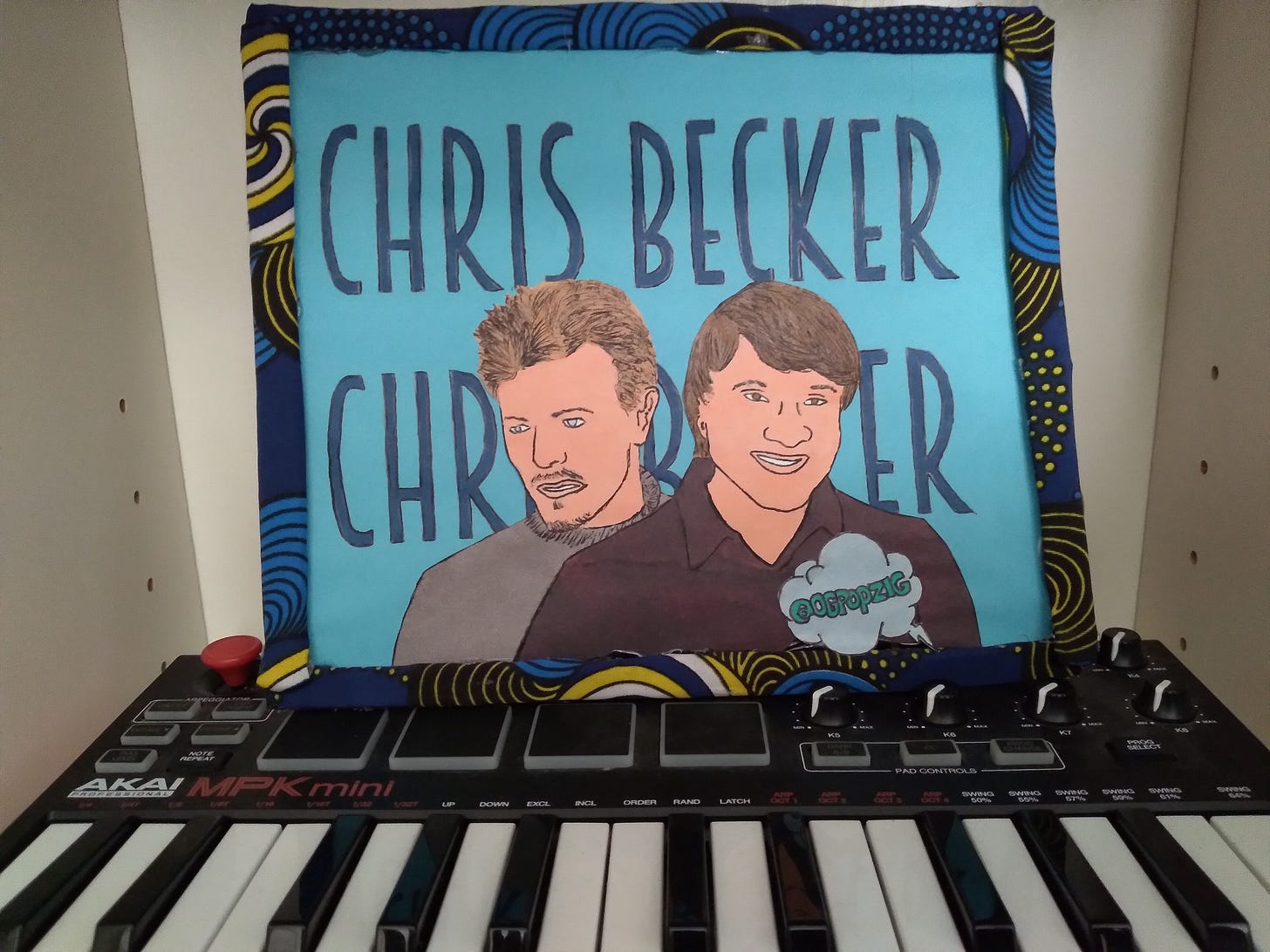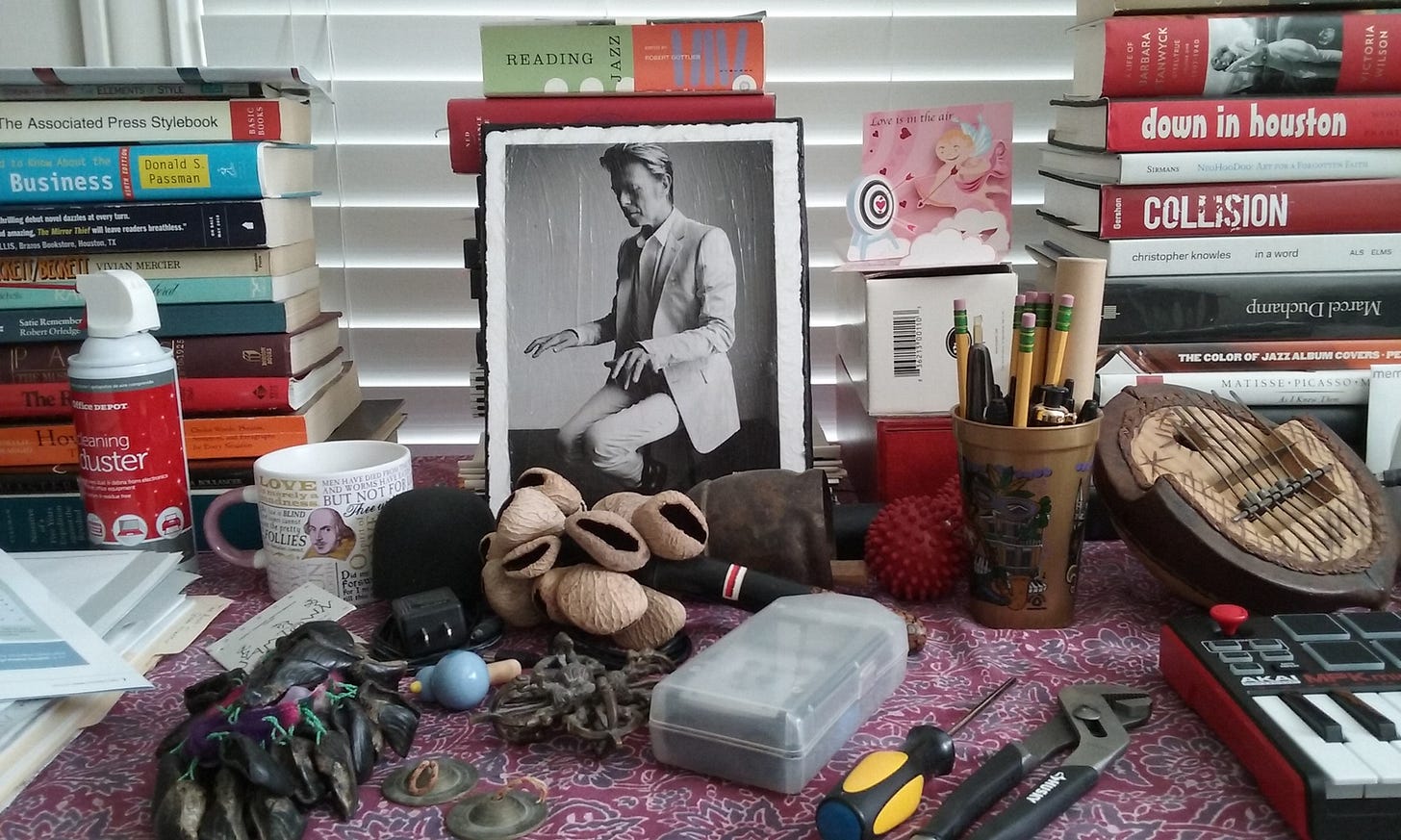(Artwork by Darius Carter, a.k.a. OGPopzIG; installation and photo by Becker)
The following is a tribute I wrote in 2022 for of my all-time favorite artists, David Bowie, who was born January 8. 1947, and transitioned January 10, 2016. The artwork above was gifted to me by Houston-based artist and arts and culture documentarian Darius Carter. At the conclusion of the article is a YouTube video of the score for my re-imagined version of Bowie’s “Heroes” for string quartet.
THERE ARE CERTAIN artists who become an even stronger presence and influence in life long after they have shuffled off this mortal coil. For me, the English musician, actor and painter David Bowie, who died on Jan. 10, 2016, just two days after his 69th birthday, and who pianist Mike Garson described as “the Miles Davis of rock and roll,” is one of those artists.
Just like a saint (which he wasn’t), Bowie has always been and continues to be a source of otherworldly guidance and archetypal energy I can tap into when I’m writing, composing music, or simply enjoying another day above ground.
Most younger folks I know were introduced to Bowie as the Goblin King in the 1986 Muppet-fantasy film Labyrinth, but my first encounter with the man goes back to 1979, when Bowie was the musical guest on Saturday Night Live. My mind was blown. I’m not sure I can convey how surreal it was for an 11-year-old boy to see this handsome 32-year-old man dressed in a skirt and heels half-crooning, half-snarling a song about a girl eaten alive by a television set (“TVC 15”) to an audience presumably much cooler than anyone who lived on my block in Columbus, Ohio. Bowie was in total command of that little stage, and he and his band — especially the Harlem-seasoned rhythm section, as well as backup singers Joey Arias and Klaus Nomi, also in drag — rocked harder than any of the crap I heard on FM radio at the time.
Soon after that jolt, Bowie’s oeuvre became a portal through which I would discover music, art, film and literature one did not encounter through a public-school education. Lou Reed, Andy Warhol, Jean Genet, William Burroughs, Philip Glass, Nina Simone . . . these are names not out of place on a liberal arts college syllabus, but in white-bread suburbia junior-high? Nope.
I was one of those alienated kids for whom music became a lifeline. “It’s like a note passed from one person to the next,” as artist and filmmaker Julian Schnabel said in an interview with Bowie, speaking about the resilience of outliers in art, adding: “You can’t lie to young people who have no cliques of power they need to support. Either they’re going to find your work useful, or it will be meaningless to them.”
(The Artist’s Tools, assemblage by Becker; Bowie decoupage by Lainie Diamond)
In his later years, Bowie spoke of how much he enjoyed introducing people, especially his son, to new things: “Because I remember when people did that for me, it felt like a gift.” I get that. If there’s one thing I love about writing, it’s how it allows me to share the work of people I admire or am just curious about. Writing gives me the opportunity to learn something new, consider a different perspective, and expand my ability to describe the abundant world we are blessed to live in.
Certainly, Bowie did this and more, and left us a legacy to share with the next generation of weird kids glued to the screen, looking for something beyond what can feel like a dull and hostile world. #BowieLives






Nice! Beautiful! I can relate!!!
I recently listened to Bowie's last great work Black Star, this recent listen moved me to tears, Art was Bowie's life and he decided to close in Art.
David Bowie is a rare talent and listening to Black Star reinforced that music and Art is good medicine for those who need spiritual healing.